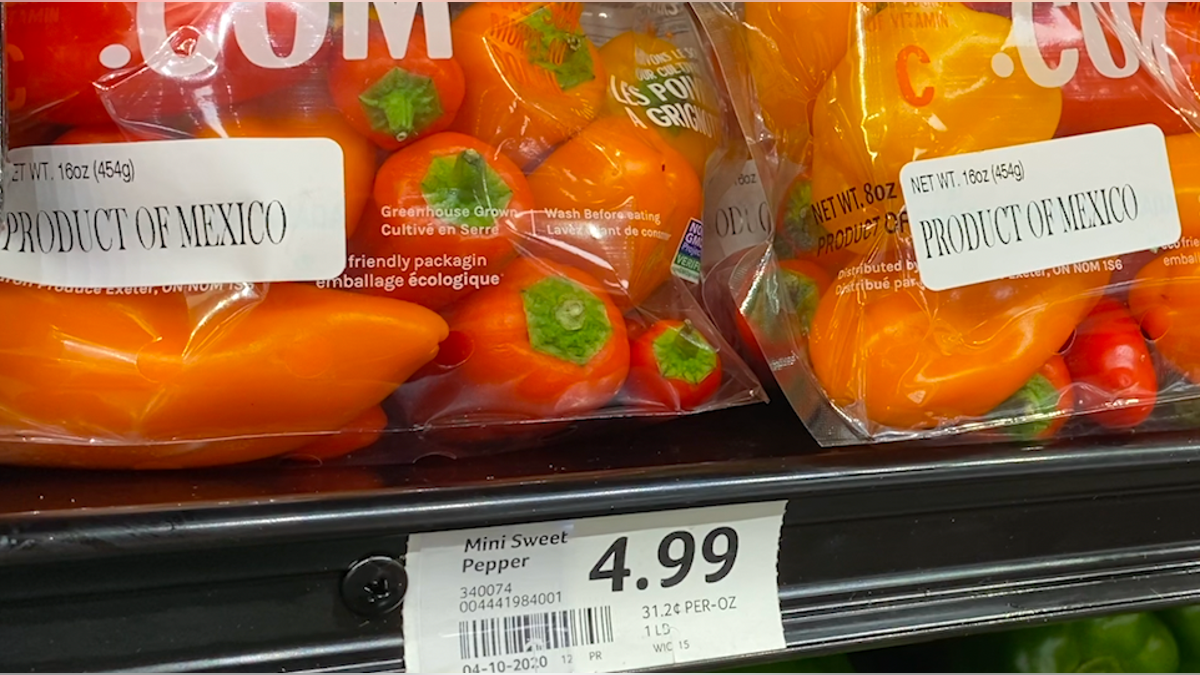Produce farmers growing increasingly worried by foreign competition
American produce farmers are concerned by the continuous rise in seasonal crop imports from foreign competition and feel the new USMCA deal is leaving them behind.
Zellwood, Fla. – Ryan Atwood left his job at the University of Florida to become a blueberry farmer in 2013. As he walks through the rows upon rows of blueberry plants, tidying up the beds and inspecting the leaves for pests, he can’t help but smile.
“It’s a fun profession, I love it,” said Atwood, with an ear-to-ear grin. “But, it’s challenging at times.”
One of those challenges that has become increasingly apparent over the years is foreign competition. Atwood said he and his business partner account for roughly 10% of Florida's blueberry production -- a sizable chunk in a state that ranks second nationally in specialty crop production.
Even so, Atwood says their chief competitors are hundreds of miles south, and west.

Ryan Atwood (pictured) tending to his blueberry crops in Zellwood, Fla.
“[Foreign imports] flood [the market] with fruit, it makes it very hard to compete,” Atwood explained. “A lot of that is due to the differences in growing something in Florida and growing it in Mexico.”
The Florida Department of Agriculture said that, simply put, it’s cheaper to grow produce in Mexico -- which is allowing foreign competition to undercut American farmers.
A recent study released by Florida Agriculture Commissioner Nikki Fried’s office stated that “Mexico has expanded their share of the U.S. domestic market by 217% since 2000 — while Florida’s market share dropped by 40%.” Similarly, nationwide seasonal crop imports from Mexico have increased by 551% during that same time span. The total damage equated to $3.7 billion in losses by Florida seasonal growers alone, per the study.
“It’s a severe crisis,” said Lawton Chiles, the national director of the organization Demand American Grown, who estimated that Florida and Georgia’s share of the eggplant and tomato markets have tanked by over 70%.
Chiles said the biggest gut punch for him was seeing so many of his fellow farmers plow over their spring harvests because of a lack of buyers during the coronavirus pandemic, yet see grocery stores stocked with non-American produce.
CORONAVIRUS PANDEMIC HITS FLORIDA'S FARMERS HARD AS MANY ON VERGE OF TOTAL-LOSS IN EARLY GROWING SEASON
“It’s a crying shame for America’s farmers to walk into grocery stores during the pandemic and say ‘hey, our crops are wasting in the field because we can’t afford to harvest them, and there’s Mexican, Peruvian and Colombian produce on the shelves.”

Bags of peppers stamped with "Product of Mexico" labels at a nearby Florida grocery store. (Robert Sherman, Fox News)
Chiles says things started to go downhill for produce farmers when the North American Free Trade Agreement [NAFTA] was passed under the Clinton administration, and the situation progressively has worsened.
The newly passed United States–Mexico–Canada Agreement [USMCA], which went into effect this July, is expected to serve as a shot in the arm to the U.S. economy as a whole. The agreement updates many of NAFTA’s trade arrangements and is estimated to create as many as 600,000 jobs, according to the White House.
Veronica Nigh, a trade economist with the American Farm Bureau Federation, said NAFTA was, by and large, a good deal for the agriculture industry as a whole, and the group expects USMCA to be even better.
“NAFTA was a very good agreement for U.S. agriculture," Nigh told Fox News. "We saw expanding trade both between U.S. exports of agricultural goods to Canada and Mexico as well as imports and more integrated supply systems for our three countries.”
“When we went into USMCA, as is with anything that is more than 20 years old, the economy has changed quite a lot. USMCA updated a lot of the rules of trade around agriculture, which will certainly benefit us into the future.”
Nigh said agriculture exports are expected to increase by about $2 billion a month in the wake of the deal.
Some of the greatest beneficiaries of the deal in the agriculture sector are dairy, poultry, and egg farmers, who will have additional access to the Canadian market.

President Trump, Canada's Prime Minister Justin Trudeau, right, and Enrique Pena Nieto, who was president of Mexico at the time, in the USMCA signing ceremony Nov. 30, 2018, in Buenos Aires, Argentina. (AP Photo/Pablo Martinez Monsivais, File)
Biotechnology, which Nigh singled out as a key advancement in agriculture that many farmers have been reliant on, also will have even more access and information sharing between the three countries to allow trade to proceed more smoothly.
But, missing from the deal were specific protections for produce farmers against foreign competition, something that farmers in the sector have been demanding for years.
Overall, Nigh gave the USMCA deal an “A” rating for farmers and contends it will make a difference, but recognizes that there is still more work to be done for produce farmers as they compete against foreign imports.
“It’s tempting to think that all agriculture is the same. We have agriculture in all 50 states including Puerto Rico, and they all grow different crops, have different seasons, and different conditions,” Nigh said.
“So as a whole, while we expect [USMCA] to be very beneficial to the sector, it would be strange to think that the conditions of the agreement would apply equally to all the sub-sectors of the industry. So, that’s our job for those in the trade field. to say ‘let’s let a good agreement go into effect, but how can we address those sectors that are facing different constraints than others?’”
This month, the U.S. Agriculture Department, the Commerce Department and the U.S. Trade Representative’s office are hosting two “field hearings” where they will be hearing from seasonal growers about this very issue. The American Farm Bureau Federation said it will be participating in and testifying at the hearings to help work toward a solution.
The first field hearing is Thursday and the next will be August 20 — both were initially planned to take place in person, but now are happening virtually due to the pandemic.
Atwood said his business partner and some of his friends intended to participate in the talks as well, and hoped a solution could emerge quickly. He said he knew too many farmers personally who have been unable to compete and eventually were driven out of business.
“I just hope we don’t wake up one day and realize we don’t have any farmers left in the United States,” Atwood said.
As a point of clarity, Atwood said he was by no means against all imports. For the sake of having fruits and vegetables year-round and outside of the harvest seasons in the United States, he thought America’s partners have been assets.
That said, he’s hopeful an arrangement can be made where American farmers can get the proverbial “first bite at the apple” during their respective harvest seasons, and then open up the market promptly afterward.
CLICK HERE TO GET THE FOX NEWS APP
Even still, Atwood feared the United States’ dependence on foreign produce could spark consequences.
“I’m a little worried for our food security as a country,” Atwood said. “It’s going to be really hard to be an independent country if we’re dependent on a foreign supply of our food which we’re becoming more and more every day.”


